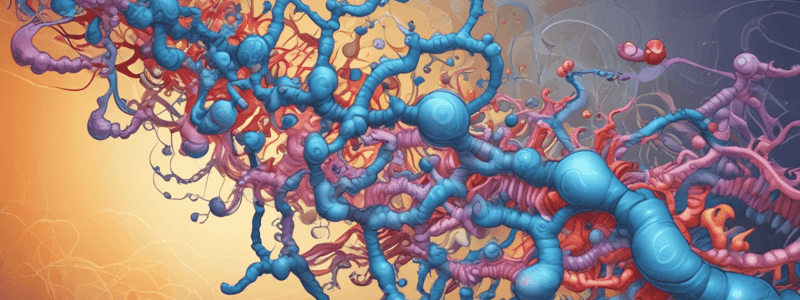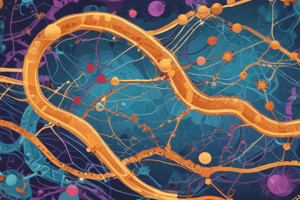Podcast
Questions and Answers
What is the function of the TATA box in transcription initiation?
What is the function of the TATA box in transcription initiation?
- Marks the start of transcription
- Joins the promoter region of the gene
- Serves as a crucial binding site for RNA Polymerase II (correct)
- Synthesizes a complementary RNA strand
Which of the following correctly describes the non-coding strand of DNA?
Which of the following correctly describes the non-coding strand of DNA?
- Serves as the template for RNA synthesis (correct)
- Contains Uracil (U) instead of Thymine (T)
- Marks the end of transcription
- Is identical to the coding strand
What role does RNA Polymerase II play during transcription initiation?
What role does RNA Polymerase II play during transcription initiation?
- Joins at the promoter region of the gene
- Adds complementary RNA nucleotides
- Binds to the transcription initiation complex (correct)
- Synthesizes thymine instead of uracil
Which factor marks the beginning of transcription?
Which factor marks the beginning of transcription?
During elongation in transcription, what does RNA Polymerase do?
During elongation in transcription, what does RNA Polymerase do?
Which element is found about 25 nucleotides upstream of a gene and binds to critical factors?
Which element is found about 25 nucleotides upstream of a gene and binds to critical factors?
What happens once the transcription initiation complex is assembled?
What happens once the transcription initiation complex is assembled?
What is an essential role of Transcription Factors in gene expression?
What is an essential role of Transcription Factors in gene expression?
What invests GTP to ensure accuracy and efficiency during translation elongation?
What invests GTP to ensure accuracy and efficiency during translation elongation?
During peptide bond formation, which ribosomal subunit catalyzes the formation of the bond?
During peptide bond formation, which ribosomal subunit catalyzes the formation of the bond?
What happens to the tRNA in the P site during the translocation process in translation?
What happens to the tRNA in the P site during the translocation process in translation?
Which component recognizes a stop codon during translation termination?
Which component recognizes a stop codon during translation termination?
What is hydrolyzed during the final steps of translation?
What is hydrolyzed during the final steps of translation?
In translation, which step involves moving the tRNA from the A site to the P site?
In translation, which step involves moving the tRNA from the A site to the P site?
What gives the analogy of aligning puzzle pieces for the correct mRNA-tRNA binding?
What gives the analogy of aligning puzzle pieces for the correct mRNA-tRNA binding?
Which analogy is used to describe the recognition of a stop codon during translation termination?
Which analogy is used to describe the recognition of a stop codon during translation termination?
What is the function of the modified guanine nucleotide added during capping?
What is the function of the modified guanine nucleotide added during capping?
What is the main role of the poly-A tail in mRNA processing?
What is the main role of the poly-A tail in mRNA processing?
Which process involves the removal of introns from pre-mRNA?
Which process involves the removal of introns from pre-mRNA?
What is the purpose of adding a poly-A tail to the 3’ end of pre-mRNA?
What is the purpose of adding a poly-A tail to the 3’ end of pre-mRNA?
Which component is responsible for facilitating the export of mRNA from the nucleus to the cytoplasm?
Which component is responsible for facilitating the export of mRNA from the nucleus to the cytoplasm?
What is the main function of splicing in mRNA processing?
What is the main function of splicing in mRNA processing?
In mRNA processing, what does 5’ capping protect the nascent mRNA from?
In mRNA processing, what does 5’ capping protect the nascent mRNA from?
Where do proteins destined for the cytosol complete translation?
Where do proteins destined for the cytosol complete translation?
What differentiates proteins destined for the endomembrane system from those destined for the cytosol during translation?
What differentiates proteins destined for the endomembrane system from those destined for the cytosol during translation?
What is the role of signal recognition particle (SRP) in protein synthesis?
What is the role of signal recognition particle (SRP) in protein synthesis?
Which step of protein synthesis involves secretory and membrane proteins taking divergent paths?
Which step of protein synthesis involves secretory and membrane proteins taking divergent paths?
What is the function of fixed ribosomes on the rough ER?
What is the function of fixed ribosomes on the rough ER?
Which organelle solubilizes secretory proteins during protein synthesis?
Which organelle solubilizes secretory proteins during protein synthesis?
What feature distinguishes free ribosomes from fixed ribosomes?
What feature distinguishes free ribosomes from fixed ribosomes?
Why are proteins continuously produced and function in the cytosol described as 'independent artisans'?
Why are proteins continuously produced and function in the cytosol described as 'independent artisans'?
What is the role of RNA in protein synthesis?
What is the role of RNA in protein synthesis?
What is the main function of transcription factors in gene expression?
What is the main function of transcription factors in gene expression?
What marks the start of transcription for a specific gene?
What marks the start of transcription for a specific gene?
Which enzyme recognizes and binds to a promoter sequence near the beginning of a gene during transcription initiation?
Which enzyme recognizes and binds to a promoter sequence near the beginning of a gene during transcription initiation?
What is the function of repressor transcription factors in gene expression?
What is the function of repressor transcription factors in gene expression?
Which type of proteins help determine which genes are turned on or off by binding to nearby DNA?
Which type of proteins help determine which genes are turned on or off by binding to nearby DNA?
In protein synthesis, what comes after the process of transcription?
In protein synthesis, what comes after the process of transcription?
Flashcards are hidden until you start studying
Study Notes
Transcription Initiation
- The assembly of transcription factors, including the TATA box binding protein (TBP), forms the transcription initiation complex.
- The TATA box, located about 25 nucleotides upstream of the gene, serves as a crucial binding site for these factors.
- TBP is part of a larger protein complex that includes RNA Polymerase II.
- Once assembled, this complex marks the start of transcription.
Initiation of Transcription
- With the transcription initiation complex in place, RNA Polymerase II binds to it.
- Additional transcription factors also join at the promoter region of the gene.
- This binding signifies the beginning of transcription.
- RNA Polymerase II reads the DNA template strand, synthesizing a complementary RNA strand.
Coding and Non-Coding Strands
- The coding strand of DNA has the same sequence as the RNA transcript, except with Thymine (T) instead of Uracil (U).
- The non-coding strand, also known as the template strand, serves as the template for RNA synthesis.
Elongation
- Once initiated, RNA polymerase begins moving downstream along the gene.
- It reads the DNA strand and adds complementary RNA nucleotides to the growing mRNA (messenger RNA) chain.
- During this process, RNA uses Uracil (U) instead of Thymine (T), pairing Adenine (A) with Uracil.
Gene Expression
- Gene expression is the process of going from DNA to a functional product (protein).
- DNA → RNA → Protein is the sequence of gene expression.
- Genotype refers to an organism's hereditary information, while phenotype refers to the actual observable or physiological traits.
- Genotype and its interactions with the environment determine the phenotype.
Transcription Factors
- Transcription factors are proteins that play a pivotal role in regulating gene expression.
- They help determine which genes are turned on or off by binding to nearby DNA.
- Activator transcription factors enhance gene transcription, while repressor factors decrease it.
Processing of Pre-mRNA to Mature mRNA
- Capping involves adding a modified guanine nucleotide to the 5' end of the pre-mRNA transcript, which serves several critical functions, including protection, ribosome binding, and export.
- Tailing involves adding a sequence of 50 to 250 adenine nucleotides (poly-A tail) to the 3' end of the pre-mRNA transcript, which protects the mRNA from degradation, assists in transporting the mature mRNA, and is involved in binding proteins that initiate translation.
- Splicing is the process of removing introns (non-coding regions) from the pre-mRNA transcript, ensuring efficient resource utilization and contributing to cellular specialization and adaptation.
Protein Synthesis and Vesicular Transport
- Proteins destined for the cytosol are continuously produced and function in the cytosol, completing translation on free ribosomes.
- Proteins destined for the endomembrane system complete translation at fixed ribosomes on the rough ER (RER).
- The ribosome's location determines its function, with fixed ribosomes on the RER specialized for proteins destined for the endomembrane system.
- Signal peptide and signal recognition particle (SRP) are involved in the targeting of proteins to the endomembrane system.
Translation Elongation
- The ribosome reads the mRNA codon in the A site, and the anticodon of the incoming tRNA base pairs with the mRNA codon.
- GTP is invested to ensure accuracy and efficiency.
- The large ribosomal subunit catalyzes the formation of a peptide bond, linking the incoming amino acid to the growing polypeptide chain.
Translation Termination
- When a stop codon (UAA, UAG, or UGA) enters the A site, it's recognized by a release factor.
- The release factor fits neatly into the P site, and the bond between the P-site tRNA and the last amino acid is hydrolyzed.
- This marks the end of translation.
Studying That Suits You
Use AI to generate personalized quizzes and flashcards to suit your learning preferences.




